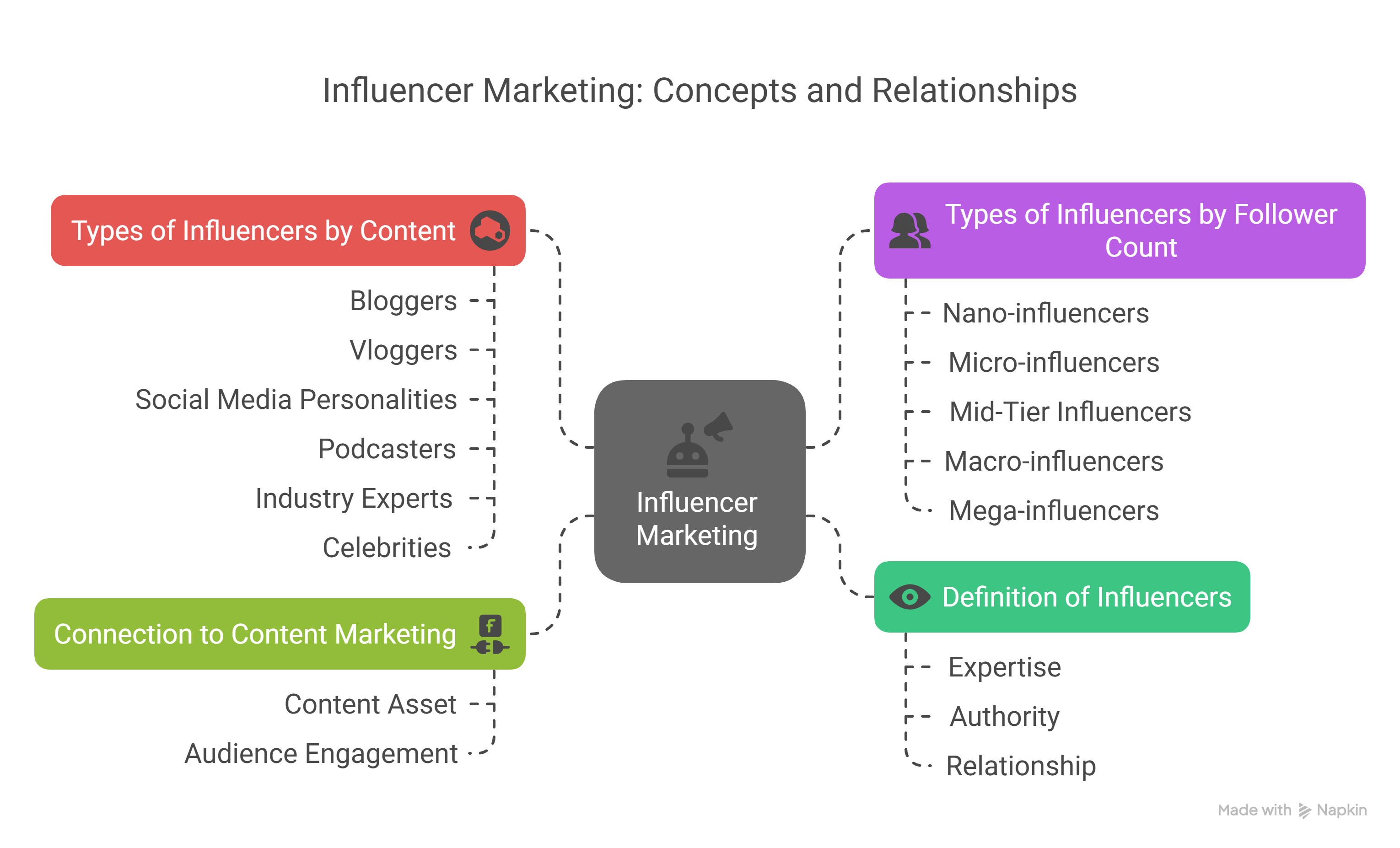Introduction to Influencer Marketing
Influencer marketing is a strategic approach where brands collaborate with individuals who have online influence to promote products, services, or messages. It leverages the trust and community these individuals have built with their audience, acting like a powerful, digital form of word-of-mouth.
Definition of Influencers
Who are they?
Influencers are people who have established a dedicated following on social media (like Instagram, TikTok, YouTube, blogs) or within a specific online community. Their influence often stems from their:
- Expertise: Deep knowledge in a specific area (e.g., cooking, tech, fashion).
- Authority: Recognition as a respected voice or leader in their niche.
- Relationship: A strong connection built with their audience over time.
In short, they are trusted figures within certain online circles or on particular subjects.
- Real-life Example: Imagine a local food blogger known for honest restaurant reviews. Followers trust their taste. If this blogger raves about a new cafe, their recommendation carries more weight for their followers than a generic advertisement.
Key Characteristics
Effective influencers typically exhibit:
-
Credibility: They are seen as knowledgeable and believable within their niche.
-
Trust: Their audience has faith in their opinions and recommendations.
-
Authenticity (Perceived): They appear genuine and relatable, not just like paid actors. Their sponsored content feels more natural when it aligns with their usual style and perceived values.
-
Audience Engagement: They actively interact with their followers through comments, DMs, polls, etc., fostering a strong community connection.
-
Real-life Example: A fitness influencer regularly shares their personal workout progress, meal ideas, and struggles. They answer follower questions (Engagement). Because they authentically share their journey and demonstrate expertise (Credibility), followers trust their recommendations for fitness apparel or protein powder (Trust & Authenticity).
Types of Influencers (by Follower Count)
Follower count provides a general idea of reach, but engagement and niche relevance are also crucial.
-
Nano-influencers (1k - 10k followers): Everyday individuals with strong influence in a small, local, or highly specific community. Often boast very high engagement.
- Example: A neighborhood gardening enthusiast trusted by local residents for plant advice.
-
Micro-influencers (10k - 100k followers): Specialists in a particular niche with a highly engaged and relevant audience.
- Example: A dedicated board game reviewer on Instagram.
-
Mid-Tier influencers (100k - 500k followers): Balance niche appeal with broader reach.
- Example: A travel vlogger focusing on sustainable travel destinations.
-
Macro-influencers (500k - 1M+ followers): More akin to internet celebrities with wide reach, potentially less niche-specific engagement.
- Example: A popular DIY home renovation YouTuber.
-
Mega-influencers (Millions+ followers): Primarily celebrities (actors, musicians, athletes) or top-tier internet stars with massive, diverse audiences.
- Example: A famous musician promoting a beverage brand on their Instagram.
Types of Influencers (by Content)
Influencers often specialize in specific content formats and platforms:
-
Bloggers: Create written content like articles, reviews, and tutorials on their websites.
- Example: A parenting blogger sharing tips and product reviews.
-
Vloggers (YouTubers): Produce video content, including tutorials, reviews, day-in-the-life videos.
- Example: A makeup artist creating beauty tutorials on YouTube.
-
Social Media Personalities: Focus on platforms like Instagram, TikTok, Twitter, creating photos, short videos, stories, and updates.
- Example: A TikTok creator known for comedic skits or dance challenges.
-
Podcasters: Host audio shows, often cultivating a loyal listener base around specific topics.
- Example: Hosts of a popular business and entrepreneurship podcast.
-
Industry Experts: Professionals (e.g., doctors, chefs, engineers, analysts) sharing specialized knowledge on platforms like LinkedIn or niche forums.
- Example: A cybersecurity expert sharing tips on Twitter.
-
Celebrities: Traditional famous individuals leveraging their existing fame on social media.
- Example: A professional athlete endorsing athletic shoes.
Connection to Content Marketing
Influencer collaborations are a vital part of content marketing. The content created by the influencer (e.g., an Instagram post, a YouTube review, a blog feature) becomes a valuable content asset for the brand.
This influencer-generated content helps brands reach and engage target audiences, often with a layer of authenticity and trust that traditional advertising may lack. It functions similarly to other marketing content by aiming to inform, entertain, and persuade potential customers.
- Real-life Example: A coffee brand collaborates with a popular lifestyle blogger. The blogger writes a post about their morning routine, featuring the brand's coffee and sharing their positive experience. This blog post is content. It reaches the blogger's audience in a relatable context, effectively promoting the coffee brand through the trusted voice of the influencer.


No Comments